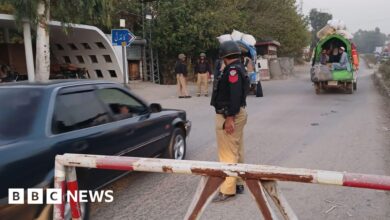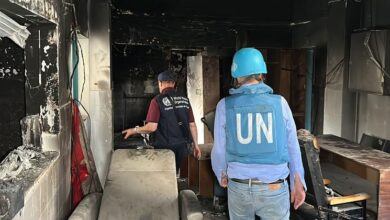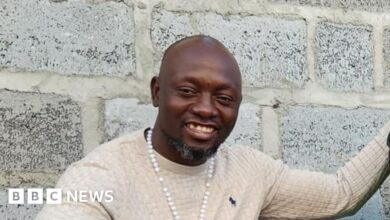Mental health crisis growing in broken country
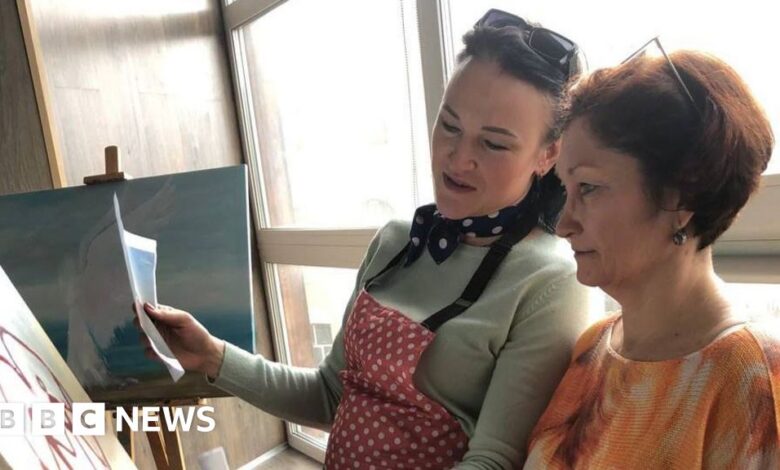
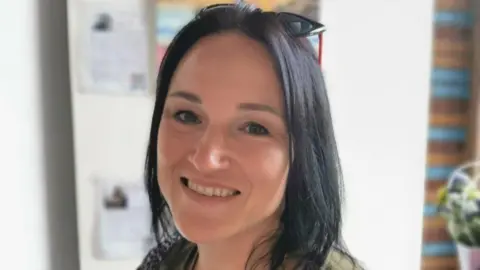 Maria Ivashchenko
Maria IvashchenkoMaria Ivashchenko’s husband, Pavlo, volunteered to fight on the very day Russia invaded Ukraine in 2022.
Six months later, he was killed during a Ukrainian counter-offensive in the Kherson region – making Maria one of hundreds of thousands of Ukrainians who lost loved ones in the war.
To cope with her grief, Maria attended therapy classes run by a volunteer group called Lively. True love stories..
During the sessions, widows and mothers of fallen soldiers express their feelings, find comfort and closure through drawing. They then accompany their drawings with written stories about their love.
Maria says painting helps express and process memories and moments that people are afraid to relive.
“There is complete trust. No one judges you, whether you laugh or cry,” she added. “They understand you unconditionally. There is no need to explain anything.”
“There’s a reason why it’s called Alive. We’re alive again. This project pulled a lot of us out of the abyss.”
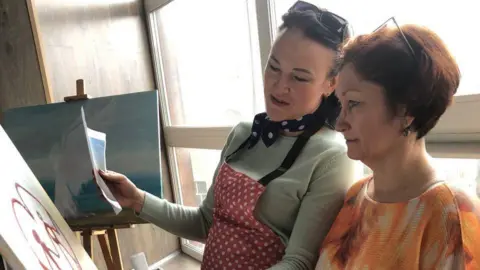 Maria Ivashchenko
Maria IvashchenkoAlive founder Olena Sokalska says more than 250 women have joined her project so far and there are currently around 3,000 on the waiting list.
Olena said the paintings often depicted scenes that reminded the women of time spent with loved ones or of dreams they had. Some painted themselves or their husbands, Olena added.
“They often painted angels, their families or their children as angels,” she said. “These paintings marked the end of their lives and the beginning of a new life.”
The Spiritual Pain of War
In addition to the pain of loss, the dangers and insecurities of war have affected millions of Ukrainians.
Anna Stativka, a Ukrainian psychotherapist, explains that when war starts, people lose safety and stability – basic human needs.
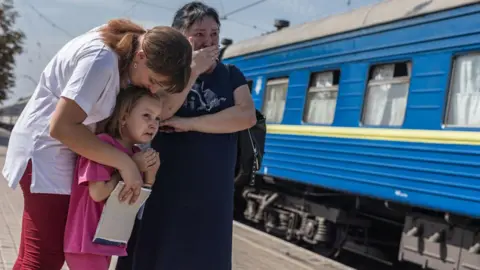 Getty Images
Getty Images“When these two basic resources are suddenly lost, it causes a lot of stress.”
In prolonged war situations, the condition can also become chronic, with symptoms such as anxiety, depression, apathy, insomnia, lack of concentration, and difficulty remembering.
“You can’t stay in this state of high alert for too long,” said Ms Stativka, adding that this would have consequences for people’s mental and physical health.
“So this is exactly what is happening to Ukrainian society,” she said.
The scale of the crisis
Research and statistics show that the proportion of Ukrainians with mental health problems is very high and on the rise.
According to the Ministry of Health of UkraineThe number of patients complaining of mental health problems has doubled since 2023, and market research data shows that sales of antidepressants have increased by nearly 50% since 2021.
A study published in the medical journal Lancet Journal found that 54% of Ukrainians (including refugees) suffered from PTSD. Severe anxiety was common in 21% and high stress levels in 18%.
Another study A survey conducted in 2023 found that 27% of Ukrainians felt depressed or very sad, up from 20% in 2021, the year before Russia’s full-scale invasion.
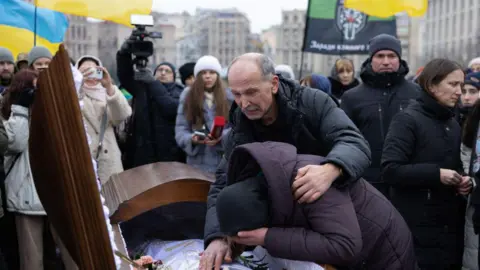 Getty Images
Getty ImagesThe World Health Organization (WHO) estimates that a large portion of Ukraine’s population may be suffering from war-related causes.
“It can have different symptoms. Some people feel sad, some feel anxious, some have trouble sleeping, some feel tired. Some people get more angry. Some people have unexplained somatic symptoms, which can be just pain or just feeling bad,” the WHO’s representative in Ukraine, Jarno Habicht, told the BBC.
Responding to the crisis
However, Mr Habicht said Ukraine had made strides in addressing the acute crisis and fighting the Soviet-era stigma associated with mental health.
He said mental health was a priority in the early months of the war. “Ukraine started talking about mental health, and I think that’s something unique that we haven’t seen in many places,” Habicht said.
Ukraine’s First Lady Olena Zelenska leads a mental health campaign called How are you? and she kept it too Third Summit of First Ladies and Gentlemen focuses on mental health in wartime. The programme is co-hosted by British broadcaster, author and mental health campaigner Stephen Fry.
In an interview with BBC’s UkrainecastMr Fry described the mental health challenges facing Ukraine as an “urgent crisis”, but said he was also impressed with what Ukraine was doing to address the issue.
“To me, it’s extraordinary that people are talking about this in Ukraine,” Mr Fry said. “This is certainly a strength of Ukraine. The day the Russians start talking about the mental health of their soldiers and the crises between them will be the day that this country is freed from some of the totalitarian horrors that it seems to be mired in at the moment.”
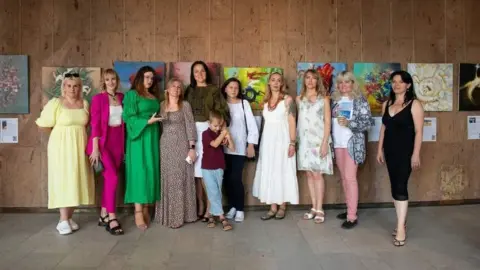 Maria Ivashchenko
Maria IvashchenkoAccording to psychotherapist Anna Stativka, one of the ways Ukrainian society copes with the trauma of war is by uniting.
She said people in general have become much more willing to help each other and much more polite, even in public. “People are talking to their neighbors more. A lot of people are volunteering, donating, trying to help each other. That’s a very stabilizing factor. We’re seeing a lot more trust in each other, a lot more empathy,” she said.
Maria Ivashchenko is now raising four children alone. But she smiles, even though she sometimes cries. Her message to others grappling with their loss is: “Don’t be afraid to talk to people. Get out of your bubble. Don’t be alone.”
“The most important thing is not to give up and not to think that you are alone in this world, or that no one cares. Oh yes, they do care,” she said.
“Our husbands did not go to war so that we could sit there and cry, but so that we could move on, so that we could continue to live.”
The effects of this war will be felt for generations to come, but the Ukrainian people are now working to overcome this trauma.



